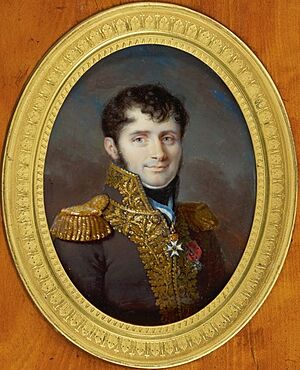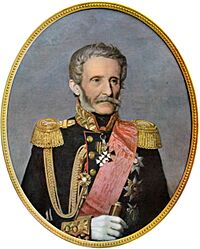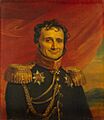Antoine-Henri Jomini facts for kids
Quick facts for kids
Antoine-Henri Jomini
|
|
|---|---|
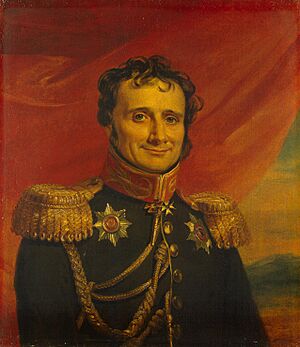
Portrait by George Dawe
|
|
| Born | 6 March 1779 Payerne, Switzerland |
| Died | 22 March 1869 (aged 90) Paris, France |
| Allegiance |
|
| Service/ |
|
| Battles/wars | |
| Awards | Baron of the Empire |
Antoine-Henri Jomini (French: [ʒɔmini]; 6 March 1779 – 22 March 1869) was a Swiss military officer. He became a general first in the French army and later in the Russian army. Jomini was one of the most famous writers about how to fight wars during the time of Napoleon.
He mostly taught himself about military strategy. His ideas are still studied at military schools, like the United States Military Academy at West Point. His theories are believed to have influenced many officers who fought in the American Civil War. He might have even created the word logistics (which means planning and moving supplies and people) in his book Summary of the Art of War (1838).
Contents
Early Life and Business Career
Jomini was born on March 6, 1779, in Payerne, Switzerland. His family was well-known, and both his father and grandfather had been mayors of Payerne. As a young boy, Jomini loved soldiers and dreamed of joining the military. However, his parents wanted him to work in business.
So, at age 14, Jomini went to a business school. In 1795, he started working at a bank in Basel. A year later, he moved to Paris and worked for other banks. But Jomini soon realized that being a banker was boring compared to army life. He decided he wanted to become a military officer as soon as he could.
Joining the Swiss Army
In 1798, when the Helvetic Republic (a new Swiss government) was formed, Jomini was excited about the changes. He quickly got a job as a secretary for the Minister of War, with the rank of captain. In 1799, he was promoted to major. He then helped reorganize how the war ministry worked.
Jomini made many procedures standard and used his position to try out new ways of organizing and planning. After a peace treaty was signed in 1801, Jomini went back to Paris. He worked for a company that made military equipment, but he found it dull. He spent most of his time writing his first book about military ideas.
This book was called Traité des grandes operations militaires (Treatise on Major Military Operations). Michel Ney, one of Napoleon's best generals, read the book in 1803 and helped Jomini publish it. The book came out in parts from 1804 to 1810. It was quickly translated and talked about all over Europe.
Serving in the Napoleonic Wars
In the French Army
Jomini joined the French army in 1805, working for General Ney. He fought with Ney at the Battle of Ulm. In December of that year, he was offered a job as a colonel in the French Army.
In 1806, Jomini wrote about how he thought the upcoming war with Prussia should be fought. Because of this, and his knowledge of Frederick the Great's wars (which he wrote about in his book), Napoleon asked Jomini to join his own headquarters. Jomini was with Napoleon at the Battle of Jena and the Battle of Eylau. For his service, he received the Legion of Honour award.
After the Peace of Tilsit, Jomini became Ney's chief of staff and was made a baron. During the Spanish campaign of 1808, his advice was very helpful to Ney. However, Jomini had arguments with Ney and faced many enemies, especially Louis Alexandre Berthier, Napoleon's chief of staff.
In the Russian Army
As early as 1807, Jomini had been asked to join the Russian army. But Napoleon found out he wanted to leave the French army and made him stay, promoting him to general of brigade. For several years, Jomini held positions in both the French and Russian armies, with both leaders agreeing.
However, when war broke out between France and Russia, Jomini was in a tough spot. He chose to take a non-fighting role away from the main battle lines. He was doing this when Napoleon's army retreated from Moscow. When the war moved to central Germany, Jomini rejoined Ney. He fought in the Battle of Lützen and did excellent work at the Battle of Bautzen.
For his actions, he was recommended for promotion to general of division. But Berthier not only removed Jomini's name from the list but also arrested him. Berthier said Jomini failed to provide certain reports. Jomini felt this reason was unfair and made up. So, during a break in the fighting, Jomini decided to join the Russian army, as he had thought about doing years before.
Many in the French army saw this as deserting to the enemy. Some of his new Russian comrades also felt this way. However, Jomini had held a Russian commission for years and had refused to take part in the 1812 invasion of Russia. More importantly, Napoleon himself noted that Jomini was a Swiss citizen, not French.
Jomini was very proud of his Swiss heritage. In 1814, he left the Allied Army when he realized they would not respect Switzerland's neutrality. Besides his love for his country, Jomini's main goals were to study, teach, and practice the art of war. When he joined the Allies, the Tsar made him a lieutenant-general and an aide-de-camp. He helped a lot during the German campaign. Napoleon later admitted that claims Jomini had betrayed French plans were false. As a Swiss patriot and former French officer, Jomini refused to take part in the invasion of France.
In 1815, Jomini was with Tsar Alexander in Paris. He tried to save his old commander Ney, who was facing execution. Defending Ney almost cost Jomini his job in the Russian army. But he managed to overcome his enemies and took part in the Congress of Vienna, a big meeting of European leaders.
Later Service and Retirement
After several years of retirement and writing, Jomini returned to the Russian army. Around 1823, he became a full general. Until he retired in 1829, he mainly focused on teaching military skills to the Tsarevich Nicholas (who later became Emperor). He also helped set up the Russian staff college, which opened in 1832.
In 1828, he served in the Russo-Turkish War. At the Siege of Varna, he received a high award called the Grand Cordon of the Alexander Order. This was his last active military service. In 1829, he moved to Brussels, Belgium, which was his main home for the next 30 years.
In 1853, Jomini tried to help France and Russia avoid war, but he wasn't successful. He was then called to St Petersburg to advise the Tsar during the Crimean War. He returned to Brussels after the war ended in 1856. Later, he settled near Paris. He continued to write books, articles, and letters about military art and history until the end of his life.
In 1859, Napoleon III asked him to plan a campaign for the Franco-Austrian War. One of his last writings was about the Austro-Prussian War of 1866 and how new breech-loading rifles changed warfare. He died in 1869, just a year before the Franco-Prussian War.
His Writings and Ideas
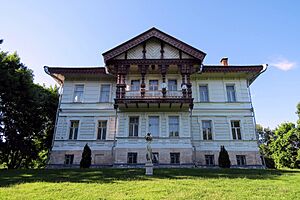
Jomini's military writings are still studied today. He liked to teach and give clear rules, using terms like "bases," "strategic lines," and "key points." His main idea for fighting was simple: put more fighting power at the most important place. He believed that using "interior lines" (moving troops quickly within your own forces to attack an enemy's spread-out forces) was the best way to win.
Jomini also believed that war was not an exact science. He said that while strategy might follow fixed rules, the overall act of war was an art. He felt that things like the emotions of soldiers, the skill of commanders, and the spirit of nations could greatly affect the outcome of battles. He thought that the number of soldiers used should be kept to a minimum to reduce injuries.
Before the American Civil War, Jomini's translated books were the only military strategy works taught at the United States Military Academy at West Point. His ideas shaped how many future generals, both for the Union and the Confederacy, thought about war. However, some historians argue that the unique geography of America, especially in the western parts, made generals like Ulysses S. Grant and William T. Sherman go beyond Jomini's ideas to find new ways to win.
See Also
 In Spanish: Antoine-Henri Jomini para niños
In Spanish: Antoine-Henri Jomini para niños
- Military strategy
- List of military theorists
Images for kids
-
General Jomini's estate in Russia near Gagino.
 | Georgia Louise Harris Brown |
 | Julian Abele |
 | Norma Merrick Sklarek |
 | William Sidney Pittman |


